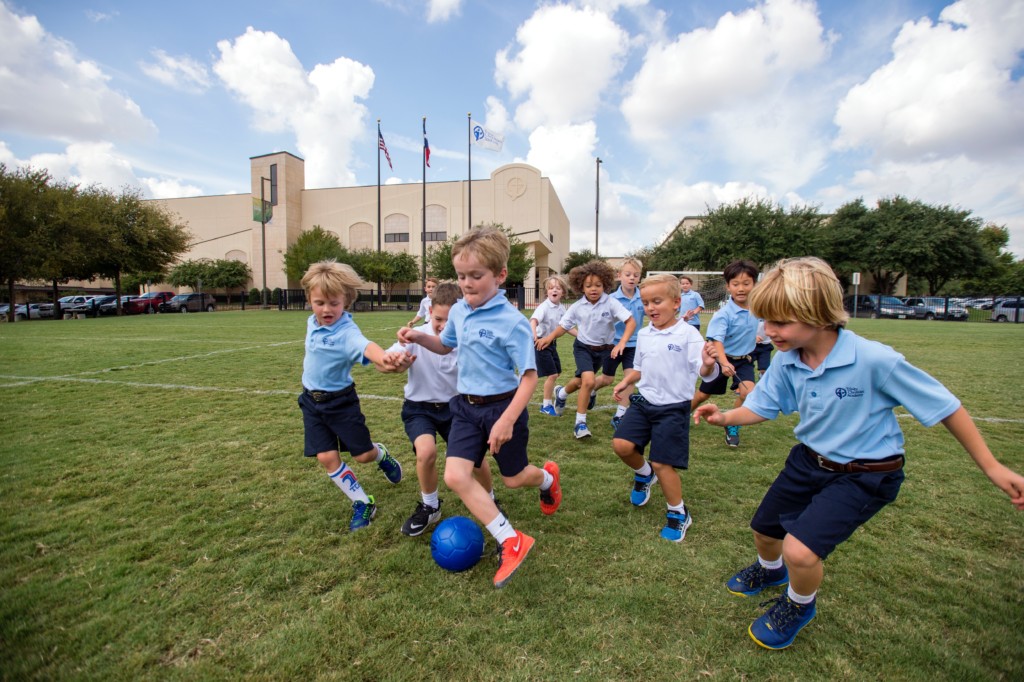**This Post has been sponsored by Trinity Christian Academy to bring you this experience!**

While talking with high school students, you might hear a wistful moan and a desire to be back in kindergarten where school included coloring, classroom games, and recess. There is a certain joy associated with the primary years of education before school becomes “serious.” However, research shows that the joy of childhood experienced through play while at home and at school is essential to a child’s healthy development and the learning process (Bettelheim, 1987). Children use play to communicate, assimilate new information and practice new concepts and skills. Play creates opportunities for children to develop their “imagination, dexterity, and physical, cognitive and emotional strength” (Ginsburg, 2007). Through play, a child may tangibly experience and manipulate elements of reality that are out of his or her control. By rehearsing, practicing, and altering storylines, a child may process emotions associated with experiences and develop coping skills for future endeavors. Time spent playing can build emotional resiliency, a key factor in a child’s ability to take on new challenges as school and social requirements increase in complexity.

While reading, writing and mathematical skills are important to success in the classroom, the lessons learned at home, during unstructured time in the classroom and on the playground about resolving conflict, recovering from disappointment and advocating for one’s desires are also key factors in a child’s ability to persevere through academic challenges.
Listed below are different types of play and their potential benefit to children:
Fantasy Play
Fantasy play, such as playing with puppets, dolls, playhouses and costumes, allows children to take on different roles, emotions and personas. Being able to step into a separate character shows the start of perspective-taking, an important skill used in verbal reasoning and reading comprehension.
Expressive Play
Expressive play, such as drawing, painting and using clay, develops fine motor dexterity. It also provides outlets for the expression of abstract concepts that are difficult for young children to verbalize. The use of expressive arts can develop the notion of symbolism, where objects represent larger concepts or emotions.
Constructive Play
Toys, such as building blocks, provide opportunities for children to utilize spatial reasoning, the analysis of patterns and symmetry and creating plans. Constructive play also creates opportunities to develop perseverance when situations do not meet one’s expectations or must be altered.
Physical Play
Physical play allows for healthy exercise, honing gross motor skills and ample opportunities to build resiliency from disappointment. Outdoor games often require negotiation of rules, which develops problem-solving skills and conflict resolution. Organized games necessitate self-control and alternating turns, which foster good sportsmanship.
The next time your child is “kidding around,” remember that great learning and growth may be happening; maybe even join in! Parental engagement with children during times of play can build strong family bonds and a sense of security that empowers children to venture out into the world ready to test their strength and abilities.
 Emily Bush, MS, LPC-Intern
Emily Bush, MS, LPC-Intern
Supervised by David Huffman, PhD, LPC-S, RPT
Emily Bush is the Lower School Counselor at Trinity Christian Academy. She has a bachelor’s degree from Wake Forest University and a Masters in Counseling from The University of North Texas. She has worked in a variety of settings, including schools, mental health clinics, hospitals and private practice.













